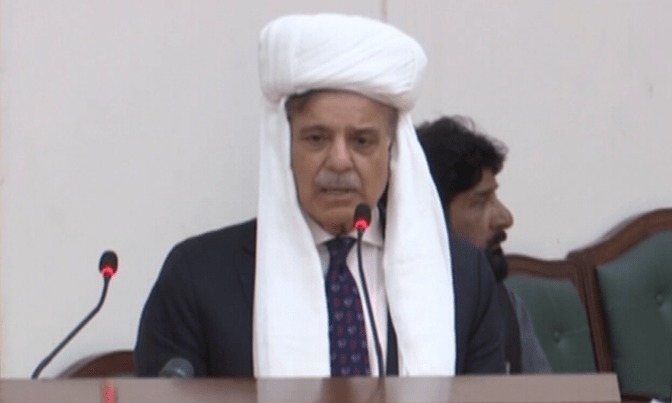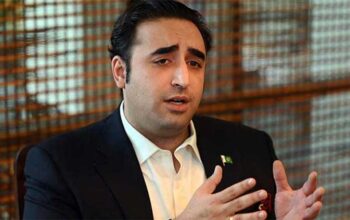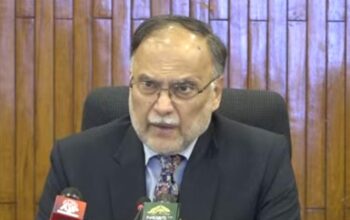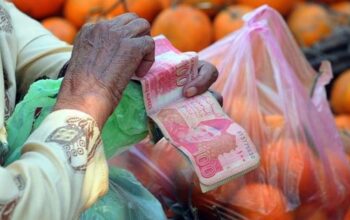By Staff Reporter
QUETTA: Prime Minister Shehbaz Sharif on Saturday called for a unified push to bring back those “misled” by terrorists in Balochistan, urging dialogue over violence as the solution to the province’s escalating security crisis.
Speaking at the Balochistan Grand Jirga in Quetta, Sharif coupled his plea for reconciliation with a pledge of Rs250 billion in federal funds for development, even as a spate of deadly attacks across the province underscored the daunting challenges ahead.
“We must make efforts to bring back the people who were misled [by the terrorists] onto the wrong track,” Sharif told the jirga, a traditional assembly of community leaders. “If there are any concerns, brothers need to sit together to solve those issues.”
He called the fight against militancy a shared responsibility. “The terrorists [in Balochistan] must not be tolerated by the public, government or armed forces. The blood-thirsty terrorists who are against Pakistan’s success and welfare must be stopped.”
The prime minister’s address unfolded against a grim backdrop. In Dera Bugti, a Levies official named Rehan was gunned down by armed assailants in the Sui Tehsil Bazaar area while heading home. His body was taken to a nearby hospital before being released to his family, and authorities launched a search for the perpetrators, though no group claimed responsibility.
That same evening, militants in Mastung district stormed a Levies police station in the Wali Khan area, setting it ablaze and destroying records. Security forces repelled an attempt to encircle the site, forcing the attackers to flee. No casualties were reported.
In Quetta’s Nawan Killi area, a roadside bomb ripped through a passing car, killing two brothers, Abdul Salam and Abdul Nafay, sons of tribal elder Sardar Abdullah Kakar, and wounding nine others. “We have received two bodies and nine injured, who were hit by splinters after the IED blast,” said Dr. Wasim Baig, spokesman for Civil Hospital Quetta.
Police described the attack as a targeted killing, though no group stepped forward to claim it. The violence followed the funeral of Hidayatullah Buledi, the additional deputy commissioner of Surab district, who was martyred in an attack at his home on Friday and laid to rest with full state honors in Kachhi district on Saturday.
The attacks reflect a broader escalation by the BLA and other militant factions, which have shifted to deadlier tactics in their decades-long insurgency. Last month, the group claimed responsibility for a large-scale assault in Surab, where militants torched police and Levies stations, looted a bank, and attempted to storm the deputy commissioner’s office before being driven back by security forces.
Pakistan’s military has increasingly pointed the finger at India, accusing it of fueling the unrest. Last month, Inter-Services Public Relations (ISPR) Director General Lt. Gen. Ahmed Sharif Chaudhry claimed India had activated its “assets” to intensify terrorist attacks, presenting what he called “irrefutable evidence” of Indian state-sponsored terrorism.
The government has since designated all terrorist organizations in Balochistan as “Fitna al Hindustan,” a term coined by the military to highlight what it describes as India’s destabilizing role.
A Ministry of Interior notification explained the move. “The change aims to reflect the true nature and ideology of these terrorist organizations and groups, and the nefarious designs of India against the people of Pakistan.”
Sharif echoed the call for dialogue and development as the path forward. “I want to ask what the gaps [there] are that we can fill with your suggestions [to solve problems],” he said, vowing that “economic or social injustices cannot happen in Balochistan during my rule.”
He pitched a hefty financial commitment of Rs250 billion for Balochistan in the upcoming federal budget, amounting to 25 percent of the total Public Sector Development Programme (PSDP) for provinces and the federation. “To me, even that seems like a small amount,” he said. “Whether it is Gwadar, Pasni, Chaman, Qila Saifullah, Quetta, Jhal Magsi or any other place, every penny of these resources must be honestly utilized for the public’s welfare.”
The pledge builds on earlier efforts to bolster the province’s infrastructure. Sharif pointed to a Rs70 billion solar initiative for farmers and the reconstruction of the N-25 Highway, a vital link between Karachi and Quetta.
Last month, he announced that savings from lower global oil prices would fund the highway project and Phase II of the Kachhi Canal, an irrigation effort aimed at reviving agriculture. “The vastness of Balochistan demands greater investment,” he said on Saturday, recalling that Punjab’s Rs11 billion contribution to Balochistan under the 2010 National Finance Commission award would equate to Rs155-160 billion today. “But for the sake of national unity, even Rs1600 billion would not be too much.”
Copyright © 2021 Independent Pakistan | All rights reserved




